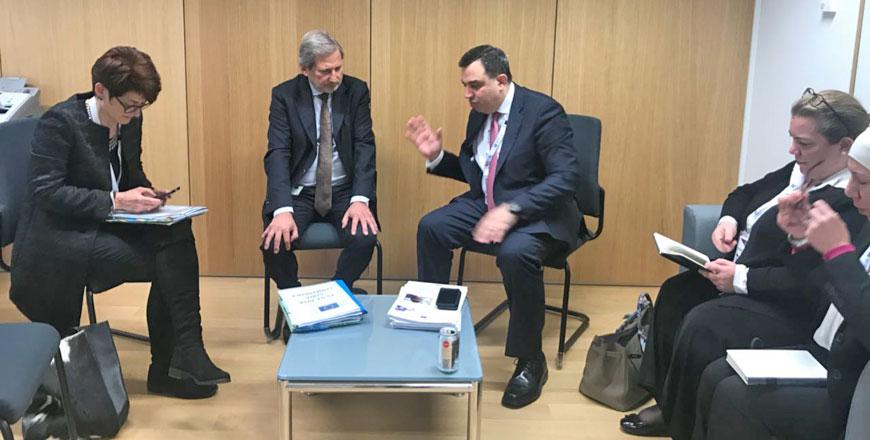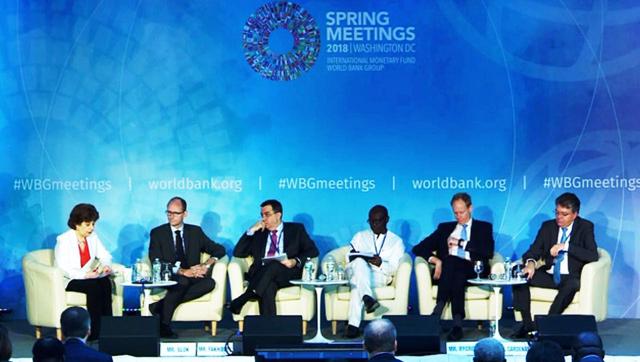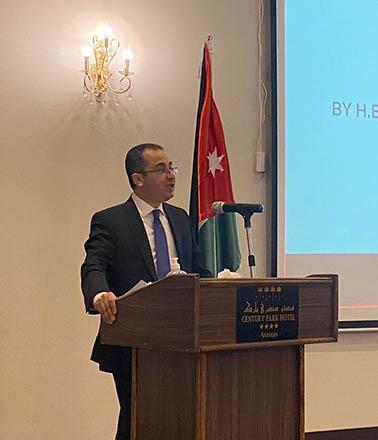You are here
Planning Ministry working with World Bank to prepare ‘matrix of structural reforms’
By JT - Dec 21,2017 - Last updated at Dec 22,2017

Minister of Planning and International Cooperation Imad Fakhoury attends the launch of the World Bank's periodic report Jordan Economic Monitor, Fall 2017, on Wednesday (Photo courtesy of Planning Ministry)
AMMAN — Minister of Planning and International Cooperation Imad Fakhoury on Wednesday attended the ceremony to launch the World Bank’s periodic report Jordan Economic Monitor, Fall 2017 under the title “Towards Stronger External Trade Performance”.
The report is prepared by the World Bank on the initiative of the Ministry of Planning and International Cooperation to enrich the process of economic analysis to deepen the dialogue on the policies required for economic reform in Jordan, according to a ministry statement.
The report presents an update on the important developments of economic policies during the last six months, and the impact of these developments on the future of the economy, according to the statement.
It also covers the future prospects of the national economy at the level of macro indicators and “specifically” addresses export diversification strategies, especially in industrial and agricultural sectors.
During the ceremony, Fakhoury said that the government will take the recommendations and analysis of the report into consideration as inputs to the economic policy for the next phase.
He added that the economic growth rates in the years following the “Arab Spring” (2011-2016) dropped to an average of 2.6 per cent compared to 6.6 per cent between 2005-2010. This sharp decline in growth reflects the impact of the unstable situation and the conflicts in the region on Jordan, the statement said.
He stressed that the burdens borne by Jordan were mostly due to the regional turmoil and the consequences, such as the closure of the border crossings, which disconnected Jordan from most of the major export markets, in addition to the increase in population, which led to great pressure on services, resources and infrastructure, resulting in fierce competition for job opportunities as well as the heavy pressure on the state budget, as a result of high costs of providing services, security measures, in addition to the outage of Egyptian gas and the high cost of energy.
The government has taken measures to mitigate the impact of the crisis, including the construction of a gas port in Aqaba, diversifying sources of energy use such as renewable energy and modifying electricity tariffs, the minister added.
Fakhoury said that the ministry is currently working with the World Bank to prepare the “matrix of structural reforms” for the coming years, which is expected to be announced during the first quarter of next year, to boost growth and employment and attract funding and support from donors.
Fakhoury explained that this matrix will form the roadmap that will lead to the required transformation in the Jordanian economy and implement the outputs and priorities of the Jordan 2025 and the Executive Development Programme (2016-2019).
This plan represents the government efforts to achieve the 2025 Vision and is currently being updated to cover the years 2018-2020, Fakhoury said.
The minister said that ministry will submit the detailed programme of the plan to stimulate the economic growth of Jordan 2018-2022 to the Council of Ministers next week, which includes all sectors targeted by the plan.
For his part, Christos Kostopoulos, a World Bank lead economist in Central Asia, said that re-opening of trade routes with Iraq offers opportunities to improve consumption and investment prospects, but given that the current trend of the Jordanian economy tends to support markets in the Gulf Cooperation Council, Syria and Iraq, deflation at the regional level will continue to affect the economy, hence there is a need for efforts to open new export markets.
Related Articles
AMMAN — The government is working with the World Bank and donor bodies to devise a five-year reform matrix on growth and job creation, Plann
AMMAN — Planning and International Cooperation Minister Imad Fakhoury called for finding new mechanisms to increase financing to Jordan with
AMMAN — Secretary General of the Ministry of Planning and International Cooperation Marwan Al Rifai met with representatives of the internat


















